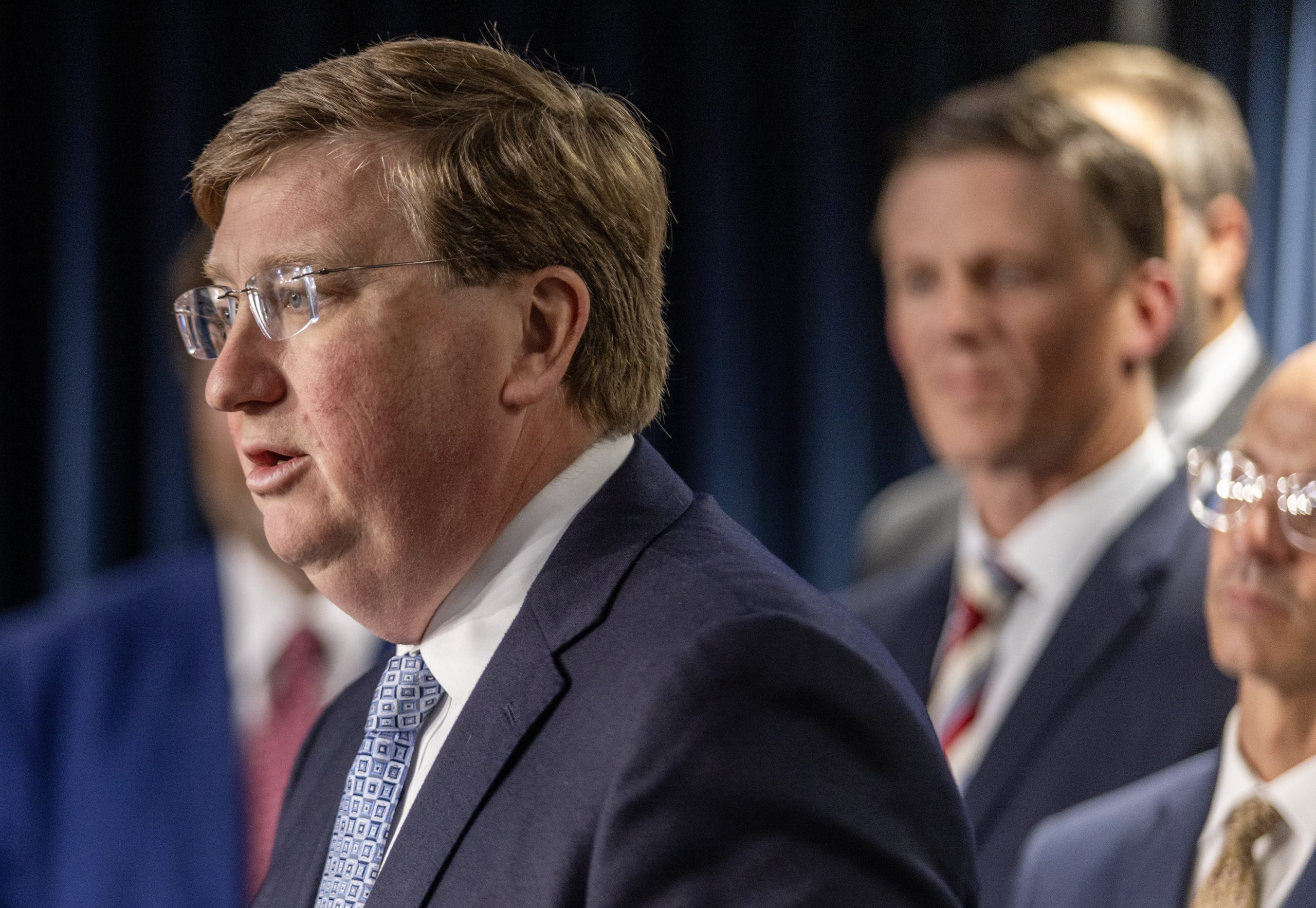Mississippi Today
Feds approve part of Gov. Reeves’ plan to help Mississippi hospitals

A plan championed by Gov. Tate Reeves to draw down more money for the state's hospitals has been partially approved by the federal government.
Thanks to the stamp of approval, hospitals could receive payments within weeks.
For years as hospitals across the state have struggled, health care experts and hospital leaders have been asking for help, most calling for Medicaid expansion. Instead, at a press conference announcing his plan in September, Reeves doubled down on his opposition to expansion and pitched a plan to draw more federal money to hospitals.
According to Reeves' office, the changes are estimated to infuse the state's hospitals with nearly $700 million in total.
The plan relies on two changes to hospital Medicaid reimbursements that increase supplemental payments to hospitals. This is extra money hospitals receive to offset low reimbursement rates from Medicaid and for uncompensated care, or money hospitals lose caring for people who are uninsured.
The component of that plan approved by the Centers for Medicare and Medicaid Services, which reimburses hospitals for low Medicaid payments at an average commercial rate for services, will generate approximately $600 million, according to the press release. It's not clear what average commercial rate (state, regional or national) the plan utilizes to yield these results — Mississippi has a low average commercial rate, according to experts.
The second component of the plan, which modifies another form of supplemental payments, has not yet been approved.
“This plan is going to strengthen our state's healthcare system and I'm glad that we could get it done for the people of Mississippi,” Reeves said in a press release. “This is the product of meetings with a range of medical professionals and healthcare leaders, and I'm truly thankful to all of them for helping to get us to today.”
Experts say the reforms will bring more money to the state's hospitals, but it won't insure more people in Mississippi, one of the most uninsured states in America. Additionally, the hospitals that appear to benefit most from the plan appear to be larger facilities, not the small rural hospitals feeling the stress of the health care crisis most acutely.
Former state hospital association director Tim Moore previously told Mississippi Today that Reeves' proposals do “nothing to help the low-wage earners in Mississippi who do not have the disposable income to pay for medical care.”
Researchers estimate the Medicaid expansion, by increasing the wage level that Mississippians would be eligible for Medicaid, would insure 200,000 to 300,000 people who currently don't qualify for Medicaid but don't make enough to pay for marketplace insurance.
While emergency rooms cannot turn down patients regardless of their insurance status, doctor's offices and clinics can. That means one of the only ways uninsured people can receive health care in Mississippi, one of the unhealthiest states in the country, is through emergency care. Preventative care, though, is inaccessible.
At the press conference, Reeves encouraged the population of Mississippians without health insurance to get a job or a better job and derisively referred to expansion as “welfare.”
In other states that have adopted similar measures, experts say the policy reforms make the biggest difference when combined with Medicaid expansion.
The federal government is still considering the second proposal. It's not clear why the plan is being considered separately.
The changes are retroactively effective beginning July 1, so the Mississippi Division of Medicaid will deliver the first round of payments to hospitals in the coming weeks, according to the press release.
This article first appeared on Mississippi Today and is republished here under a Creative Commons license.
Did you miss our previous article…
https://www.biloxinewsevents.com/?p=313965
Mississippi Today
On this day in 1945
April 30, 1945

Sister Rosetta Tharpe, known as the “godmother of rock ‘n' roll,” made history by becoming the first gospel artist to rocket up the R&B charts with her gospel hit, “Strange Things Happening Every Day.” In so doing, she paved the way for a strange new sound.
“Rock ‘n' roll was bred between the church and the nightclubs in the soul of a queer Black woman in the 1940s named Sister Rosetta Tharpe,” National Public Radio wrote. “She was there before Elvis, Little Richard and Johnny Cash swiveled their hips and strummed their guitars. It was Tharpe, the godmother of rock ‘n' roll, who turned this burgeoning musical style into an international sensation.”
Born in Arkansas, the musical prodigy grew up in Mississippi in the Church of God in Christ, a Pentecostal denomination that welcomed all-out music and praise. By age 6, she was performing alongside her mandolin-playing mother in a traveling evangelistic troupe. By the mid-1920s, she and her mother had joined the Great Migration to Chicago, where they continued performing.
“As Tharpe grew up, she began fusing Delta blues, New Orleans jazz and gospel music into what would become her signature style,” NPR wrote.
Her hard work paid off when she joined the Cotton Club Revue in New York City. She was only 23. Before the end of 1938, she recorded gospel songs for Decca, including “Rock Me,” which became a huge hit and made her an overnight sensation. Little Richard, Aretha Franklin and Jerry Lee Lewis have all cited her as an influence.
“Sister Rosetta played guitar like the men I was listening to, only smoother, with bigger notes,” said singer-songwriter Janis Ian. “And of course, personally, any female player was a big influence on me, because there were so few.”
After hearing her successors on the radio, Tharpe was quoted as saying, “Oh, these kids and rock and roll — this is just sped up rhythm and blues. I've been doing that forever.”
On the eve of a 1973 recording session, she died of a stroke and was buried in an unmarked grave. In the decades that followed, she finally began to receive the accolades that had eluded her in life.
In 2007, she was inducted into the Blues Hall of Fame, and money was raised for her headstone. Eleven years later, she was inducted into the Rock and Rock Hall of Fame.
“She was, and is,” NPR concluded, “an unmatched artist.”
This article first appeared on Mississippi Today and is republished here under a Creative Commons license.
Mississippi Today
House agrees to work requirement, Senate concedes covering more people in Medicaid expansion deal
With minutes to spare before a Monday-night deadline, House negotiators conceded a Senate demand that Medicaid expansion would include a strict work requirement for those covered — a requirement not likely to be approved by the federal government.
The Senate had already backed off its initial proposal that would only cover the poorest of the poor, would still leave tens of thousands of poor working Mississippians uninsured and would have turned down billions in federal money to cover the costs.
House and Senate negotiators agreed to a deal that would expand Medicaid to about 200,000 people who make up to 138% of the federal poverty level, roughly $20,000 for an individual. It would require recipients to prove they work for at least 25 hours a week.
The plan will be a “hybrid,” as first proposed by the House. People up to 99% of the federal poverty level would be covered by traditional Medicaid. Those making 100% to 138% of FPL would be covered with subsidized private insurance plans from the federal exchange.
Neither House Medicaid Chair Missy McGee, a Republican from Hattiesburg, nor Senate Medicaid Chair Kevin Blackwell, a Republican from Southaven, answered questions from reporters at the Capitol about the agreement on Monday night.
“A compromise requires concessions between the chambers,” Republican Lt. Gov. Delbert Hosemann said in an earlier statement. “The Senate requires a real work requirement, but our plan now covers individuals up to 138 percent of the federal poverty level.”
The Affordable Care Act, the federal legislation that allows states to expand Medicaid coverage, does not authorize work requirements. However, states can seek a federal waiver from the Centers for Medicare and Medicaid Services to implement them.
CMS under the Trump administration did sign off on some states using work requirements, but under the Biden administration, the federal agency has not approved requests and rescinded the ones that had been approved.
The House's original plan directed state officials to seek a waiver for work requirements, but would have expanded Medicaid even if the federal agency denied it. House leaders previously pointed out that people with income above the federal poverty level are likely working.
The Senate, however, drew a hard line that it would only agree to an expansion plan that contained work requirements — a stance that could at the least delay expanded coverage, perhaps for years, or prevent it from ever happening.
READ MORE: House, Senate leaders swap Medicaid expansion proposals as Monday night deadline nears
If CMS denies Mississippi's waiver for a work requirement, the compromise proposal directs the state Division of Medicaid to apply for a work requirement waiver each year the first denial.
It also directs state officials to immediately apply for a waiver if CMS starts approving work requirements in other states.
Senate leaders have expressed optimism that the Biden administration will be so pleased with longtime Medicaid expansion holdout Mississippi making an effort that it would approve a work requirement, or that the conservative federal 5th Circuit Court would approve it if litigated.
Work requirements in states that previously had them proved to be costly and ineffective, with a large amount of costs going into administration of the work requirements instead of medical services.
The agreed proposal will likely bring an end to several days of House and Senate negotiators trading proposals back and forth with one another behind closed doors.
Right up to the 8 p.m. Monday deadline, it was unclear if legislative leaders would reach a compromise. They signed the agreement with only minutes to spare.
Reporters, lobbyists and advocates gathered at the Capitol waiting to see if lawmakers could broker a deal to establish what many believe could be the most transformative state policy since Gov. William Winter's Education Reform Act of 1982.
But despite earlier vows by House and Senate leaders to negotiate Medicaid expansion in public, the final details were worked out behind closed doors and negotiators declined comment Monday night.
Now that the negotiators have signed off on an agreement, the Capitol's two chambers have until Wednesday to either approve the proposal, reject it or send it back to negotiators for further work. The 2024 legislative session is expected to end within days, although lawmakers have already had to push back deadlines for agreeing to a state budget.
The Medicaid expansion proposal places a 3% tax on managed care organizations to cover the state's costs, and the Legislature's rules require a three-fifths majority of the lawmakers in both chambers to approve bills that enact taxes.
But the actual threshold the two chambers likely need to achieve is a two-thirds majority, needed to override a potential veto from Republican Gov. Tate Reeves, a longtime opponent of expansion.
Passage of the compromise, particularly by a wide margin, may be difficult in both chambers. House Democrats, who support Medicaid expansion, have threatened to oppose any bill with a work requirement. Any expansion measure is a tough sell in the Senate, and its earlier more austere plan barely garnered a two-thirds vote.
Senate Minority Leader Derrick Simmons, D-Greenville, on Monday night said he was glad the two chambers came to an agreement and he looks forward to seeing more details.
“I am grateful we are finally at a point where we are working to provide access to health care to Mississippians who desperately need it and have been waiting for it for a long time,” Simmons said.
This article first appeared on Mississippi Today and is republished here under a Creative Commons license.
Mississippi Today
Law enforcement officers’ oversight bill heads to governor’s desk
The Mississippi Senate passed legislation Monday to give the state's officer certification board the power to investigate law enforcement misconduct.
House Bill 691, the revised version of which passed the House Saturday, is now headed to the desk of Gov. Tate Reeves.
The bill comes in the wake of an investigation by the Mississippi Center for Investigative Reporting at Mississippi Today and The New York Times into sheriffs and deputies across the state over allegations of sexual abuse, torture and corruption. The reporting also revealed how a “Goon Squad” of officers operated for two decades in Rankin County.
Public Safety Commissioner Sean Tindell said if the governor signs the bill, he anticipates the Mississippi Board on Law Enforcement Officer Standards and Training would hire a few investigators to investigate matters and make recommendations.
The bill would enable the board to establish a hearing panel on any law enforcement officer “for whom the board believes there is a basis for reprimand, suspension, cancellation of, or recalling the certification of a law enforcement officer. The hearing panel shall provide its written findings and recommendations to the board.”
In addition, deputies, sheriffs and state law enforcement would join police officers in the requirement to have 20 hours of training each year. Those who fail to get such training could lose their certifications.
Other changes would take place as well. Each year, the licensing board would have to report on its activities to the Legislature and the governor.
The bill calls for a 13-member board with the governor having six appointments – two police chiefs, two sheriffs, a district attorney and the head of the law enforcement training academy.
Other members include the attorney general, the public safety commissioner, the head of the Highway Patrol, and the presidents of the police chiefs association, the constable association, the Mississippi Campus Law Enforcement Association and the sheriff's association (or designee).
This article first appeared on Mississippi Today and is republished here under a Creative Commons license.
-
Local News5 days ago
Sister of Mississippi man who died after police pulled him from car rejects lawsuit settlement
-
Mississippi Today5 days ago
At Lake High School in Scott County, the Un-Team will never be forgotten
-
Mississippi Today2 days ago
On this day in 1951
-
Mississippi News3 days ago
One injured in Mississippi officer-involved shooting after chase
-
Mississippi News7 days ago
Viewers make allegations against Hatley teacher, school district releases statement – Home – WCBI TV
-
Mississippi News Video6 days ago
Vehicle struck and killed man lying in the road, Alcorn County sheriff says
-
Mississippi News5 days ago
Ridgeland man sentenced for molesting girl
-
Mississippi News6 days ago
Suspected Dollar General armed robber arrested in Pickens County





































